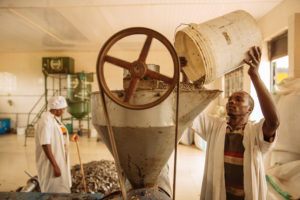Public investments can be instrumental in promoting agricultural growth and ensuring food security; nonetheless, public investment in agriculture and rural areas remained stagnant for many years. To spur increased and strategic public spending in agriculture, the Food and Agriculture Organization of the United Nations (FAO) and the International Food Policy Research Institute (IFPRI) combined their data and technical knowledge in public expenditures.
Initially, FAO and IFPRI each conducted separate research on public expenditures in developing countries. IFPRI developed a public expenditure database called Statistics of Public Expenditure for Economic Development (SPEED) that was released in 2010 and later expanded with help from the IFPRI-led CGIAR Research Program on Policies, Institutions, and Markets (PIM). Subsequently, FAO and IFPRI decided to share their complementary work and generate innovative evidence to support strategic investments that stimulate agricultural growth. In 2012, FAO released SOFA: Investing in Agriculture for a Better Future, for which IFPRI provided two background papers and data to show patterns of agricultural public spending across developing regions. Information and analysis on agricultural investment is underpinning FAO’s work in assisting governments to improve the allocation of public funds to promote sustainable agriculture and food security.
Recognizing the need for developing countries to establish their own policy monitoring and analysis systems in support of policy reform, FAO launched the Monitoring and Analysing Food and Agricultural Policies (MAFAP) program in 2011. MAFAP provides country-specific policy data management, policy monitoring and analysis, (ex-ante) policy impact analysis, and policy advice. IFPRI contributes data on price distortions and public expenditure levels and compositions. Throughout MAFAP’s conceptual stages, FAO acknowledged that close cooperation with IFPRI in developing methodologies and in capacity building was valuable to MAFAP.
In 2014, FAO and IFPRI worked with the government of Malawi to implement a country-specific MAFAP program. They started by developing a common approach to data collection, in cooperation with the country’s Ministry of Agriculture and Food Security, to better assess the impact of public investments. Today, MAFAP is building the country’s first public expenditure database on agriculture and rural development to support policy makers and development stakeholders in assessing whether public resources are allocated in priority areas. Guided by the partnership between FAO, IFPRI, the IFPRI-led CGIAR Research Program on Policies, Institutions, and Markets (PIM), and other collaborators and funders, MAFAP is helping inform policy decisions on public spending and raising capacities to monitor, analyze, and reform food and agricultural policies.
For more information on IFPRI's work in partnership with FAO, please go to this brochure.



